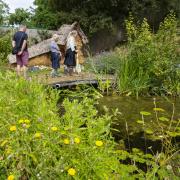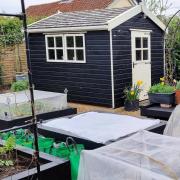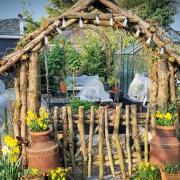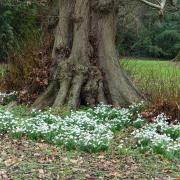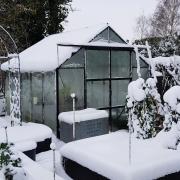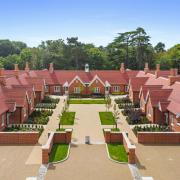In search of a more mindful lifestyle, Stacy Cronly-Dillon became a successful professional beekeeper
Bees are special creatures, and no one understands this better than Stacy Cronly-Dillon.
Five years ago, Stacy had a successful marketing career as a brand manager for a company in Essex. But a life of exciting photo shoots and invitations to glamorous events started to take its toll. Slowly, Stacy became more and more stressed by the demands of the job - even regular yoga sessions couldn't help. In search of calm, Stacy turned to beekeeping. Somewhere deep down, she knew that nature had the power to heal humans.

'My grandad was warden of a wildlife trust site. I used to spend quite a lot of time with him there and I was always intrigued by the bees. Also, I'd read Santa Montefiore's book, The Beekeeper's Daughter, in which this woman communes with bees and it just got me thinking.' Stacy took a one-day introductory course to beekeeping, then joined a local association of beekeepers and soon had two colonies of bees.
'It was only once I connected with the bees that I understood I needed a more sustainable, slow-paced existence for my own physical and mental health - and that there was an alternative to the relentless corporate slog I had been used to. The more time I spent with the bees, the more I felt the drive to do my bit to protect them and to contribute to the reversal of their declining numbers for the future of the environment.'
In 2018 Stacy set up Sunnyfields Apiaries and soon had 20 colonies. 'Looking back, it was a bit of a mistake,' she says. 'I was still working at the time and underestimated how much time looking after the bees needed. It was a steep learning curve.' So, in 2021 Stacy gave up her job. Craving a country lifestyle, and needing more space for the bees and additional hives, she and partner Mark decided to move - with the bees - to north Suffolk. She knew a little about the county, as her mum lives near Eye, and the house she and Mark found reminds her of her grandfather's where she learned so much about nature.

Now she is a full-time beekeeper, guardian of 25 colonies of honeybees, each hive alive with up to 45,000 bees, and each with its own personality, according to Stacy. She has launched a series of award-winning courses and beekeeping experiences at Sunnyfields, for others curious about nature, bees and honey. Her life in the Waveney Valley couldn't be more different, she says. 'Suffolk is such an amazing county,' she says. 'The farming community and local business are so supportive. I can find everything I need here.'
Stacy’s passion and goal is to spread the word about the vital role the 270 species of bees in the UK play in pollination and to demonstrate how everyone can support honeybees. Her beekeeping experiences at Sunnyfields Apiary are for total beginners and those thinking about setting up a hive at home, introductory courses which give an overview of the life of a bee, the beekeeper’s role in running a hive, and the next steps in getting started. Stacy shares her knowledge and shows visitors what the bees are doing and the work that each of them is carrying out.

'I want visitors to learn about the important difference the bees make by getting up-close and personal with them. Each bee has its own role to play, depending on its maturity. Some fly to and from the hive, gathering food and water, others nurse new bees in the making, whilst others dedicate their days to looking after the queen.' Stacy removes frames from the hive, enabling people to see the honeycomb and bees, explaining how the bees communicate with one another. 'We stimulate all of the senses, from the scent of wood and wax, to the buzz of the bees themselves, and the session ends with a taste of the diverse range of honeys all produced locally.'
With climate change and environmental considerations high on the political agenda and with businesses looking for tangible ways to support the environment, Stacy is keen to work with and educate the corporate community about the value of bees. 'Over the past decade, businesses have become increasingly conscious of the environmental impact they are having. Brands and businesses are looking for ways to prove to their customers and employees that they are environmentally considerate and making a positive difference.'
With this in mind, Stacy has developed a corporate hive sponsorship programme which provides home for a colony of honey bees, helps other bees with wildlife habitats and supports planting for pollinators. The programme also includes an employee engagement scheme, with opportunities to visit the bees to gain a better understanding of the difference pollinators make to the local environment. And there is something inspiring about these industrious, organised, highly communicative little insects that appeals to companies, says Stacy. 'A honey bee is incredibly good at teamwork!”

While the main part of her business is the bee experiences, Stacy also produces wax for polishing, candles and decorations, and sells some honey, although she is careful not to completely empty her hives, taking only as much as she feels she needs. 'It's really important to support all pollinators,' she says. 'Bees really are the gateway to learning about the environment. They tell us so much about what's going on.'
With the loss of so much of their wild habitat, most bees are now foraging in our own back gardens and most of the honey bee population is managed by humans, says Stacy. So if you'd like to know more, and perhaps give bees a home, why not give her a buzz?
sunnyfieldshoney.com






